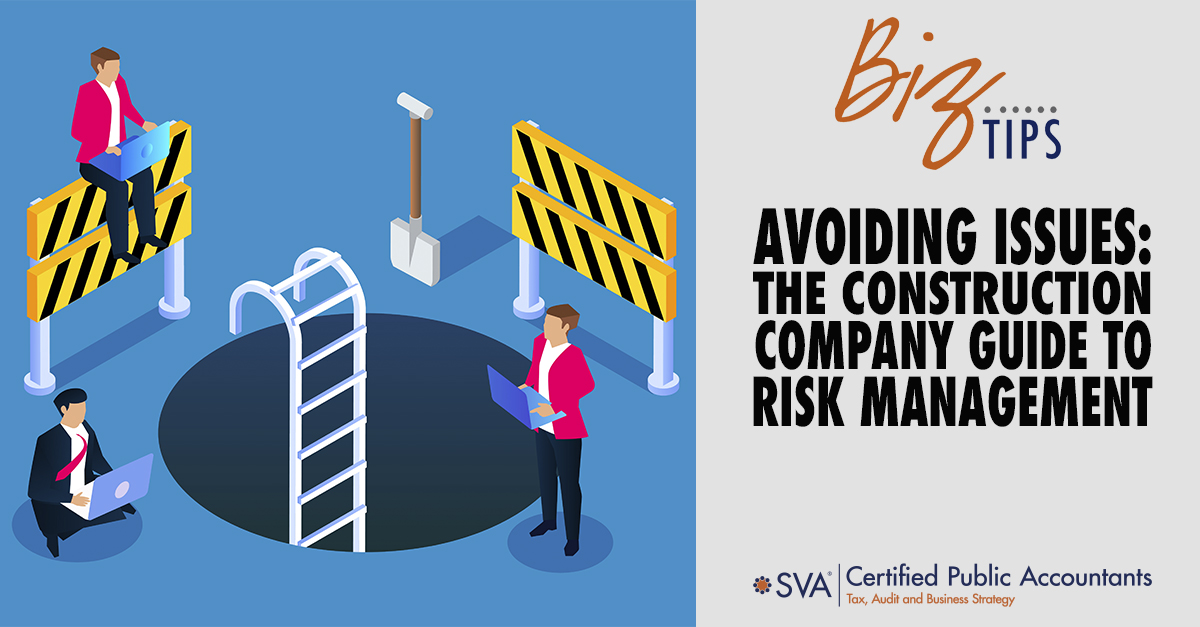As we're beginning to see hope for the end of the COVID-19 pandemic, it's more important than ever for construction companies to use a proactive, aggressive approach to risk management.
As postponed projects begin to come back online, new projects appear, labor shortages continue, supply chain issues continue to be problematic, costs rise, and the economy remains questionable, it's vital to your company's financial well-being that you consider whether the owners, vendors, and subcontractors you're working with are able to maintain their position financially.
Create a Risk Management Team
If you haven't already done so, your leadership needs to put together a risk management team to help ensure your strategic planning. This team needs both leadership and risk management personnel, especially people from operations, financial, and legal departments.
Representatives of your projects need to provide status updates to that team including labor and subcontractor problems, potential changes, claims, any notices, directives from the owner, project estimates, actual costing, and schedule changes. These issues and financial concerns should be regularly discussed in meetings.
Risk Management in Accounting
Outside of meetings, accounting needs to remain on top of their accounts to be able to provide up-to-date information, while outside advisors keep your company updated on legal, tax, and financial implications when you consider contractual obligations or business model changes.
Of particular importance is job-costing data for accounting including supplier price increases, costs pertaining to COVID-19, additional project costs such as labor and equipment, and project change orders, as well as scheduling and delay costs that can result in future claims. This allows accounting to create projections and cash flow forecasts to measure against actual figures, making it easier to monitor financial standing.
There is a wide range of available tools to help you project cash flow, deficit forecasts, take care of shortfalls, check working capital, determine liquidity, and whether you are able to or need to borrow.
Evaluating Existing Contract Risk
Risk management should be a part of each project, which should be separated based on financial viability. Projects that are struggling should have alternative considerations including financial guarantees from owners and assistance with periodic payments for subcontractors and vendors who are having problems.
Look at which contracts may necessitate changes and prioritize those that will work collaboratively rather than cause problems. Quickly address options with your stakeholders, focusing significant resources on protecting your company's legal rights so you can comply with contractual obligations with those who will cause problems.
Speak with your legal advisor to decide if you need to give written notice to the project owner if you foresee any continued COVID-19 shutdowns or delays based on the contractual and insurance requirements of the project. Make sure that if you do have to shut down, the site is secured. Use asset management software with Bluetooth or RFID technology to track inventory and prevent product or equipment theft, damage, or loss.
(Download Video Transcript)
Evaluating New and Potential Contract Risks
Estimating projects requires risk evaluation. Most construction companies focus on constructing their backlog while bidding on more jobs than they normally would. However, you need to provide reasonable proposals, as low-ball proposals on a high-risk project may cost your company everything.
Develop a project-rating system using factors such as your required minimum profit and if you have the capacity and skills in your crew to take on the project. Consider the timeframe, bonding requirements, and type of work, then prioritize the projects that can provide your company with the best profit margin. Carefully consider the materials needed to ensure they'll be available either currently or when needed so that supply chain disruptions won't impact your work as readily.
Evaluating Subcontractors
It's necessary to subcontract work in many projects, but it also expands your risk. When working with subcontractors, consider requiring more frequent financial statements, monitoring liquidity and leverage ratios and changes in their surety ability, WIP, and manpower. Companies relying on credit lines and banks have a higher level of risk due to the stricter credit market.
To help you vet your subcontractors properly and minimize your risk exposure from them, there are a range of prequalification forms you can find online to use with your subcontractors.
Insurance Considerations
With the delays and shutdowns caused by COVID-19 and the impacts it has had on the industry, adding profit and business interruptions insurance is a great option to consider, as well as insurance options to cover supply chain issues causing income loss and COVID-19-related insurance for environmental, subcontractor default, worker's compensation, and management liability issues. You can also diversify your suppliers, which may help manage risk.
Keep in touch with your insurance company to get details on policy extensions, delayed or shutdown project insurance price quotes, and to stay on top of coverage and eligibility issues. This also makes it easier to stay on top of rate increases and restrictions on coverage.

© 2021 CPA ContentPlus

